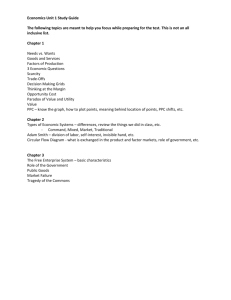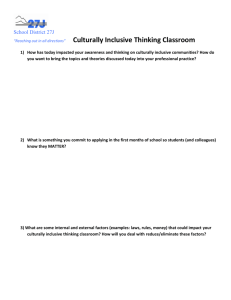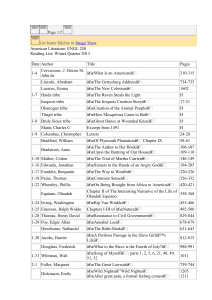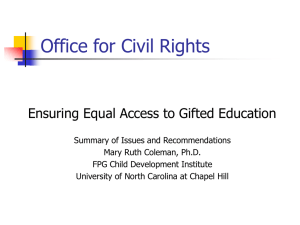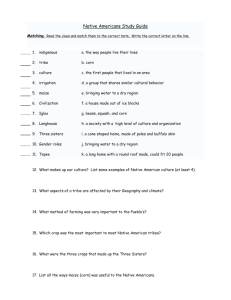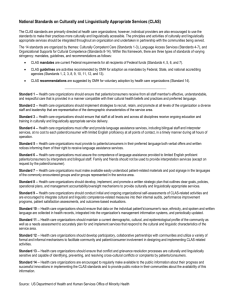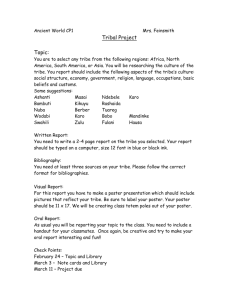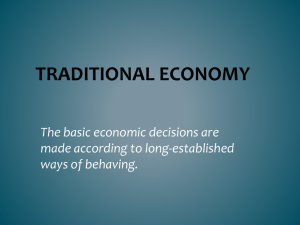How is access to mental health care for linguistically and culturally
advertisement
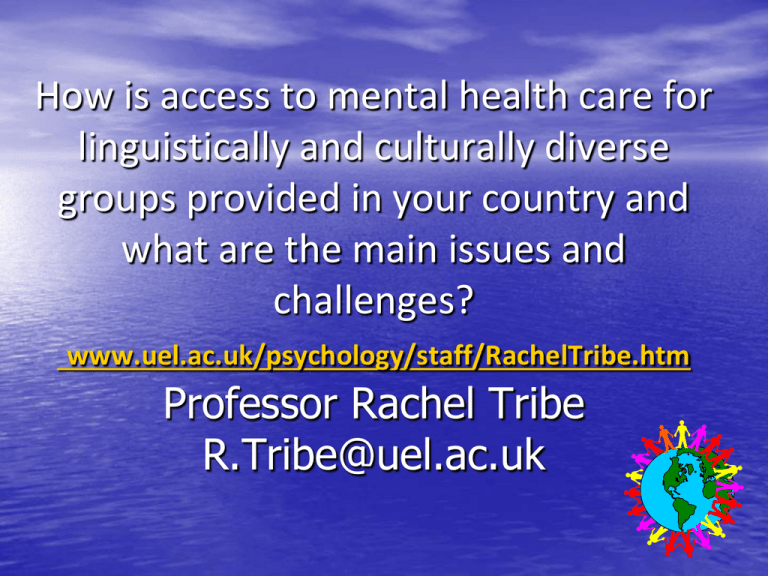
How is access to mental health care for linguistically and culturally diverse groups provided in your country and what are the main issues and challenges? www.uel.ac.uk/psychology/staff/RachelTribe.htm Professor Rachel Tribe R.Tribe@uel.ac.uk Linguistically and culturally diverse groups Mental health and Communicating across Language and Culture Linguistically and culturally diverse groups : mental health • 1. Overview of different migrant groups- though definitions are contested • 2. Language :Culture :Mental Health • 3. Idioms of distress, explanatory health beliefs and presentation • 4. A critical psychology/psychiatry perspective on PTSD or is it a normal reaction to abnormal events partly constructed by culture? • 5. Guidelines on working with Interpreters /bi-cultural workers • In the UK mental health services have been found to be inaccessible or inappropriate (Patel, 2000; Lago, 2011; Lane & Tribe, 2014) • Usage of mental health services by migrants is poor compared to the white community (Bhugra & Gupta, 2011; Tribe, 2014) • Racism may play a role and perceived discrimination may adversely affect psychology well-being (Fernando, 2014, Mckenzie, 2003) • Stigma and fear around mental health may be influenced by different cultural formulations and models (Bhugra, 2009; Royal College of Psychiatrists, 2015 ) In the UK almost everyone historically is a migrant Notion of migration contested- in the literature and politically Working party on Mental Health and Migration set up by the World Psychiatric Association Bhugra, D., Gupta, S., Bhui, K., Craig, T., Dogra, N., Ingleby, J.D., Kirkbride, J., Moussaoui, D., Nazroo, J., Qureshi, A., S tompe, T. & Tribe, R. ( 2011) World Psychiatric Association Guidance on Mental Health and Mental Health Care In Migrants. World Psychiatry, 10,1, 2-10 1.Overview of different migrant groups Contextual variables - Different groups may have different needs Recent migrants Refugees & asylum seekers Individuals from established migrant families who remain largely within that community and do not mix (gender politics and age may play a role here). The Multicultural Cube Individual Family Group MultipleCommunity perspectives Country Refugees and asylum seekers Many asylum seekers and refugees report feeling that they were ‘silenced’ or their voices were ‘taken away from them’ by political regimes which did not allow for multiple accounts or voices which stifled criticism prior to them seeking asylum. Thus talking about their problems with a health professional may feel difficult, issues of trust may have become compromised (Tribe, 2010). It is often assumed by people who speak only one language that an interpreter simply replaces one word for another 2. Language: Culture: Mental Health different languages are not directly inter-changeable in the way that is often supposed (Mudarikri, 2003; Tribe, 2003/7). Language not only transmits meaning it may also construct and shape it. Language is not a transparent medium but may act as a defining structure in itself, (Anderson & Goolishian, 1992; Burr, 1995) ex Ms, patronising, birthdates Organisational, institutional and cultural barriers for health professionals and service users include; •Time – health professionals are increasingly busy and resource intense patients or those viewed as such may not be welcomed •Cultural beliefs and fears about mental health (Bhui, 2015; Bhugra, 2015) •Assumptions that a western diagnostic system is the only mechanism for understanding distress, though it is culturally located (Summerfield, 2001; Fernando, 2014) •Lack of understanding of diversity (Fernando, 2014; Bhui, 2015) • Notion that as people from certain communities don’t use mental health services - an assumption is made that they don’t need them and it becomes self perpetuating (Fernando, 2014: Tribe, 2014) Language:Culture:Mental Health II Understanding diversity- multicultural cube applies to everyone “An individual practitioner may strive admirably to understand the contribution of their client’s culture to the conversation created between them ……, but will rarely give the same scrutiny to the role of their own culturally-determined belief system”. Patel et al (2000) Idea that much of mental health/ psychology/psychiatry been built around a set of assumptions located in the west, which may not always be generalisable. Issues to consider when building and sustaining a health system sensitive to the needs of linguistically and culturally different communities in respect of mental health particularly? Community psychology or engagement as a form of critical psychology in building accessible and appropriate services - a challenge to the status quo within mental health? (ex- football, tai chi, Chinese older adults, Sri Lankan well being project) Community engagement Implementing NICE guidance 2014 LGB16 NICE advice [LGB16] Published date: March 2014 Local authorities have a responsibility to promote and protect health, tackle the causes of ill-health and address health inequalities – engaging effectively with the local community can help achieve this (Health 2020; Healthy lives, healthy people; Fair society, healthy lives) Key messages If local authorities and their partners get local communities involved in decisions about how to design or improve services this will make services more effective, cost-effective and sustainable – and there will be greater uptake. Engaging with the community can build trust in local authorities and their partners by improving accountability. It can also help develop a sense of community and encourage people to adopt more healthy attitudes and behaviours (Strategic Action Programme for Healthy Communities Literature Review - Phase one: November 1999–March 2000. . Local authorities may be at risk of challenge or judicial review if community engagement does not adhere to legislation. There is also the risk of getting community engagement wrong and there is legislation on when and how it should be done, for example, the Equalities Act 2010 and the Gunning Principles (R v Brent London Borough Council, ex parte Gunning [1985] 84 LGR 168). Lane, P. & Tribe, R. (2010) Following NICE 2008: a practical guide for health professionals on community engagement with local black and minority ethnic (BME) community groups Diversity, Health & Care, 7, 2,105-14. Service users/experts by experience and health workers from culturally and linguistically diverse backgrounds can inform service provision and help and ensure that services are more accessible and appropriate 3. Idioms of distress, explanatory health beliefs, health seeking behaviour and presentation • Idioms of distress -Way distress is presented may be culturally located • Culture bound or concept bound ‘syndromes’ - syndromes which are specific to a particular culture or area What does it take to build and sustain a linguistically and culturally sensitive health system in respect of mental health particularly? • Need to consider idioms of distress, explanatory health beliefs, health seeking behaviour and presentation Idioms of distress and presentation -Way psychological distress is presented may be culturally located ( Sierra Leone) cartesian split,fever in sl Explanatory health beliefs How people understand their health and well-being, may not fit with western constructions ( possession by spirits / jinn, notions of causality and heredity – marriage pros) Health seeking behaviour How and from where might help be sort (elders, indigenous healers, rituals) pathways to care etc 4. A critical psychology/psychiatry perspective on PTSD or is it a normal reaction to abnormal events partly constructed by culture? The debate about whether the language of mental health/illness is the most appropriate when some one has been through a traumatic event/s is a complicated issue, and one that raises strong opinions. Practitioners in mental health services frequently report that few refugees ( or migrants- Bhui & Bhugra, 2013) present themselves (Bernier, 1992; Miller, 1999). There are three major hypotheses that dominate the literature on migration and specifically refugees, trauma and mental health: Summary of the 3 major discourses on PTSD 1. anyone who has been through the experiences of an asylum-seeker and has lost so much must be ‘damaged’ or traumatised. The diagnosis applies across cultures and is generalisable. 2. people are very resilient and any reaction they have must be a normal one to abnormal events. A label of PTSD is unhelpful and is not culturally generalisable (Summerfield 1998) 3. many refugees go through immensely trying times, which may be extremely distressing. Traumatic reactions can be many and may not constitute PTSD • Culture and meaning may act as intervening variables. Some people may benefit from appropriate psychological help, which may not always be best presented as Western Medical/psychiatric help A diagnosis can be functional for an asylum seeker in terms of asylum reports and accessing resources. It can also be containing and make the health practitioner feel better and that they have ‘dealt with the issue’. It is important to remember that becoming a migrant or an asylum-seeker or migrant is always a major event in an individual's life. However, it is not the defining characteristic but rather a part of their whole life. 5. Working with Interpreters/Bicultural workers Guidelines for psychologists working with interpreters produced by Prof R Tribe & Dr K Thompson for the British Psychological Society • Guidelines available from r.tribe@uel.ac.uk plus • Free DVD & brief guidance notes available from me or the DVD at www.youtube.com/watch?v=k0wzhakyjck British Sign Language • British Sign Language (BSL) interpreters for deaf people, has its own specialist literature, • We note with concern the National Institute for Mental Health (NIMHE, 2004) findings that the level and organisation of mental health services for Deaf people was far from adequate. • The NIMH report also comments on the need for more BSL interpreters to be trained as well as the need for clinicians to work alongside them and undertake relevant training. • More recently, the UK government has recognised BSL as a language in its own right. Linguistically and culturally diverse groups: Mental Health 1. Overview of different migrant groups- though definitions are contested 2. Language :Culture :Mental Health 3. Idioms of distress, explanatory health beliefs and presentation 4. A critical psychology/psychiatry perspective on PTSD or is it a normal reaction to abnormal events partly constructed by culture? 5. Working with Interpreters/bi-cultural workers
